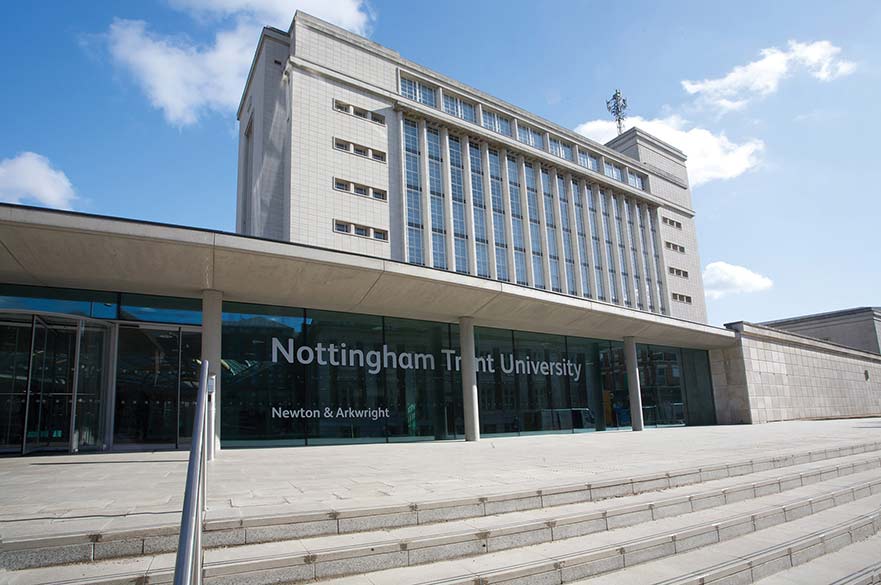Universities join forces to help businesses boost UK economy
Nottingham Trent University is involved in a £4.68million project to help businesses and entrepreneurs bring their ideas to life and help boost the UK economy through the Government’s new Connecting Capability Fund (CCF).
By Chris Birkle | Published on 11 April 2018
Categories: Press office;

The university has joined forces with De Montfort University, Brunel University London and industry bodies to create a specialist company called Impacting Business By Design to work with SMEs to commercialise ideas and innovations.
Impacting Business By Design will provide design, technical, and development support, incentivise investment and nurture design innovation skills, culture and systems in SMEs and entrepreneurs. It aims to increase the number of new products being brought to market in the UK, increasing investment and protecting the country’s industrial competitiveness.
The universities will work in collaboration with design professionals, Chartered Alternative Investment Analyst Association (CAIA), EEF The Manufacturers’ Organisation, and Leicester & Leicestershire Enterprise Partnership (LLEP).
The CCF aims to drive forward new collaborations between universities and other partners. The award is part of a £67million investment by Research England as part of the National Productivity Investment Fund.
Professor Peter Ford, Professor of Design at DMU’s Design Unit who is leading on the project, said: “This funding recognises the excellent track record in design research not only here at DMU’s Design Unit but at Brunel and Nottingham Trent, as well as the close industry partnerships which all three universities share.
“Impacting Business By Design has a huge potential to not only bring more products to market but to make it easier for SMEs and entrepreneurs to innovate, create jobs and grow the UK economy.”
The team have already provided concepts, designs and product into a wealth of different sectors including Medical Technologies, Safety and Security and Smart Cities
Professor John Hunt, Medical Technologies and Advanced Materials Theme Leader at NTU
Dr Ian de Vere, Head of Design at Brunel University London, said: “This project will build on Brunel Design’s strong existing industry engagement, and will provide the opportunity for our design expertise to directly contribute to innovation and new product development within the UK. We look forward to collaborating with SMEs to bring new products and technologies to market.”
Professor John Hunt, Medical Technologies and Advanced Materials Theme Leader at NTU, said: “This is a fantastic opportunity to combine the respective strengths and expertise of the institutions collaborating in this innovative initiative to provide a really powerful team that is able to take on the multiple, different and technology rich complex design problems that businesses and industry will present. The team have already provided concepts, designs and product into a wealth of different sectors including Medical Technologies, Safety and Security and Smart Cities.”
Overall these projects involve 54 higher education institutions collaborating with each other and directly with and more than 120 individual businesses and investors, as well as wider business and investor networks. The projects are attracting more than £322 million of additional investment from universities, businesses, investors and other partners.
David Sweeney, Executive Chair of Research England, said: “These projects demonstrate the commitment of universities to work together to strengthen the R&D and technological capabilities of the UK, building upon our successful Higher Education Innovation Fund (HEIF). In the Industrial Strategy, the Government asked us to improve our ability to turn exciting ideas into commercial products and services. Universities have stepped forward in these projects to show that they can do world class commercialisation, alongside world class science. I believe these projects present important innovations that should inform our strategic approach to commercialisation in UK Research and Innovation for the future.”
The Connecting Capability Fund is highlighted in the Government’s Industrial Strategy and will help achieve its aims of enhancing UK industrial competitiveness and productivity.
Notes for Editors
Press enquiries please contact Chris Birkle, Public Relations Manager, on telephone +44 (0)115 848 2310, or via email; or Dave Rogers, Public Relations Manager, on telephone +44 (0)115 848 8782, or via email.
Nottingham Trent University was named University of the Year 2017 at the Times Higher Education Awards and Modern University of the Year in The Times and Sunday Times Good University Guide 2018. The award recognises NTU for its strong student satisfaction, quality of teaching, overall student experience and engagement with employers.
Nottingham Trent University (NTU) has been awarded the highest, gold, rating in the Government’s Teaching Excellence Framework for its outstanding teaching and learning.
NTU is one of the largest UK universities with nearly 28,000 students and more than 3,500 staff across four campuses, contributing £496m to the UK economy every year. It is one of the most environmentally-friendly universities, containing some of the country’s most inspiring and efficient award-winning buildings.
The University is passionate about creating opportunities and its extensive outreach programme is designed to enable Nottingham Trent to be a vehicle for social mobility. NTU is the sixth biggest recruiter of students from disadvantaged backgrounds in the country and 95.6% of its graduates go on to employment or further education within six months of leaving.
NTU is home to world-class research, winning The Queen’s Anniversary Prize in 2015 - the highest national honour for a UK university. It recognised the University’s pioneering projects to improve weapons and explosives detection in luggage, enable safer production of powdered infant formula and combat food fraud.
With an international student population of approximately 2,600 from around 100 countries, the University prides itself on its global outlook.